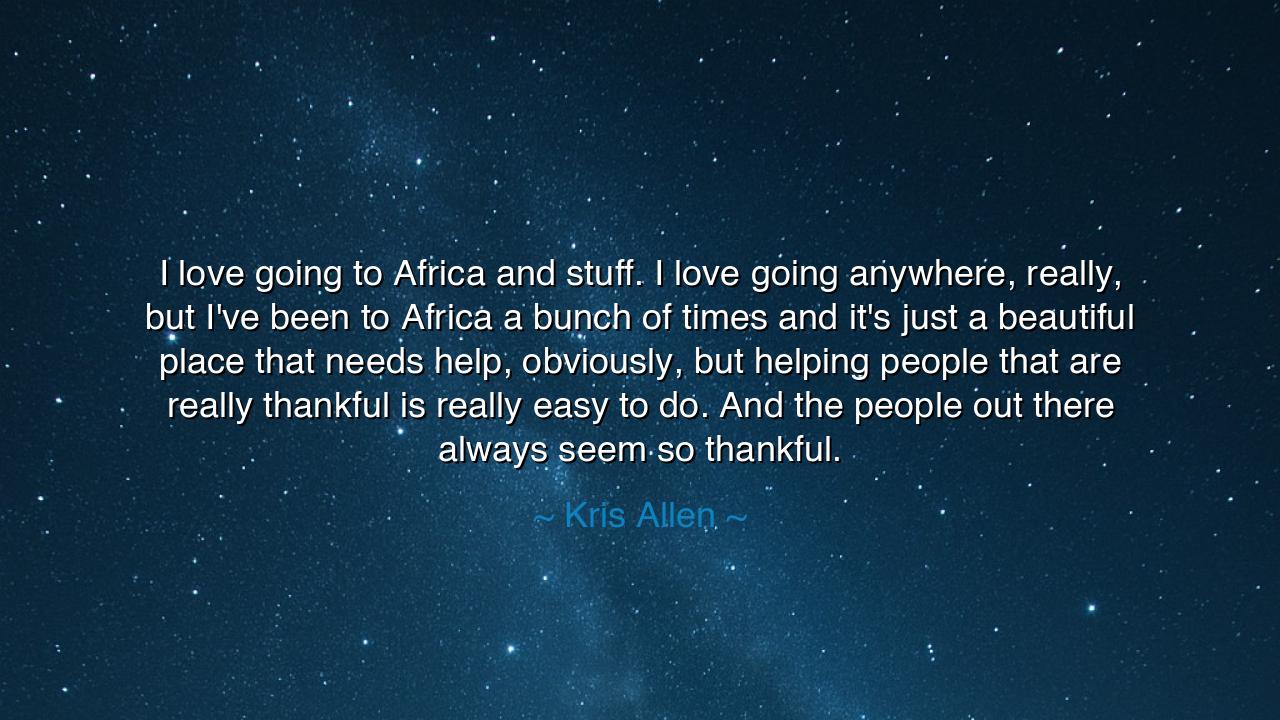
I love going to Africa and stuff. I love going anywhere, really
I love going to Africa and stuff. I love going anywhere, really, but I've been to Africa a bunch of times and it's just a beautiful place that needs help, obviously, but helping people that are really thankful is really easy to do. And the people out there always seem so thankful.






Kris Allen once spoke these heartfelt words: “I love going to Africa and stuff. I love going anywhere, really, but I’ve been to Africa a bunch of times and it’s just a beautiful place that needs help, obviously, but helping people that are really thankful is really easy to do. And the people out there always seem so thankful.” In this reflection lies not only admiration for a land, but a recognition of the noble power of gratitude. He reminds us that when hearts are open and thankful, the act of giving becomes light, and the bond between giver and receiver becomes sacred.
The ancients often taught that to give without gratitude from the one receiving is like pouring water into the sand—it vanishes without trace. Yet when a gift is met with a spirit of thankfulness, it multiplies the joy of both giver and receiver. Allen’s words celebrate this eternal truth. In Africa, he found not only need, but beauty; not only poverty, but dignity; not only struggle, but radiant gratitude. That gratitude transformed the burden of charity into the joy of service, reminding him—and us—that the highest form of giving is a partnership between souls.
History offers many echoes of this truth. Consider the tale of Albert Schweitzer, the great physician who left Europe to serve in Lambaréné, Gabon. He did not see the people there as helpless, but as partners in survival and dignity. The gratitude he received from those he treated did not diminish his sacrifice; rather, it renewed his strength and inspired generations to follow. Just as Allen says, helping people who are thankful is easy, for their spirit gives back to the giver more than words can measure.
Yet Allen also acknowledges that Africa is a place that “needs help.” Here lies another layer of his words: the recognition that beauty and struggle often live side by side. To see only the struggle is blindness; to see only the beauty is naivety. But to see both, and to respond with compassion, is wisdom. Africa, in his eyes, is not a land of despair but of resilience, not a continent defined by lack but by the abundance of human spirit. In this way, his quote becomes a lesson in perspective: that even where help is needed, dignity and gratitude shine as lights that cannot be extinguished.
The heart of his reflection is this: thankfulness makes giving easier. Where there is resentment or entitlement, charity becomes heavy and strained. But when those in need meet generosity with open hands and open hearts, the act of giving becomes a dance, a harmony of human souls. This is why Allen found joy in returning again and again: because gratitude transforms obligation into delight. And delight in giving is the seed of lasting change.
The lesson for us is timeless: do not only look for places where you can give, but also seek the spirit with which you give and receive. When you offer your time, your resources, your compassion, do so with humility, recognizing the humanity of those you serve. And when you are the one in need, return with gratitude, for your thankfulness is itself a gift to the giver. Gratitude is not weakness—it is strength, for it binds communities and nourishes the soul of both sides.
Practically, this means finding opportunities to serve where your gifts meet the deep needs of others. It means listening as much as giving, honoring the dignity of those you help, and cherishing their gratitude as a blessing in itself. It means living as a participant in the cycle of giving and receiving, knowing that one day you may be the helper, and another day the one in need. In each role, let gratitude guide you.
Thus, Kris Allen’s words become more than a memory of travel; they are a reminder of an eternal truth: that the beauty of giving lies not only in the act itself, but in the gratitude that meets it. And where gratitude abides, giving is not a burden, but a joy—a song of humanity that rises above need and echoes across generations.






AAdministratorAdministrator
Welcome, honored guests. Please leave a comment, we will respond soon